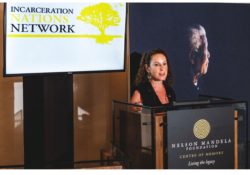Post #167
650 words; 3 minutes to read
Dr Baz Dreisinger is a professor of writing at the John Jay College of Criminal Justice in New York City. In this work she has been very involved in programs that teach English and other college courses to prisoners – the Prison to College Pipeline program. That work took her to prisons in various parts of the United States.
A few years ago, Dr Dreisinger traveled around the world, visiting prisons in 9 countries in an effort to understand more about the experience. ‘Incarceration Nations’ is the result. The book describes her experiences with prisons and prisoners in Rwanda, South Africa, Uganda, Thailand, Singapore, Jamaica, Brazil, Australia and Norway. It is a mix of personal experience, the stories of the prisoners she met, and research into the system in each of these countries.
The nature of the prisons she visited in these countries varied enormously, with some (such as Australia and Singapore) being much less difficult places than others (such as Brazil or Thailand). However she only saw 1 or 2 institutions in each country, not necessarily representative. In any country conditions are likely to vary quite significantly from one prison to another.
Problems with prison everywhere
Dreisinger is definitely not a fan of prisons generally. “Prisons…are revenge on a grand scale. And while correction makes sense, is retribution ever a justifiable aim?” She likes a definition she cites of punishment as ‘that collective violence which any society defines as legal, just as crime is the individual violence that we define as illegal’. In other words, prison necessarily involves a kind of violence even if sanctioned by the state. She favours restorative justice approaches over the inherent punishment that prison necessarily creates. She sees crime as emerging primarily from unfair and unequal social conditions, so that societies first create criminals and then punish them for it. The fact that in every country those in prison are primarily drawn from the poor and minorities testifies to the inequality built into criminal justice.
‘In various incarnations all over the world, money and justice are bonded together in unholy matrimony… your case is as strong as the lawyer you can afford… Justice is, ubiquitously and dispiritingly, not only for sale but also costly.’ Those who lack the means are much more subject to punishment by the state even if their actions are no worse, or even much less so, than the wealthier or better connected.
The impulse to help rather than transform
Although Dreisinger gives much of her time and energy to programs that provide education in prisons, she has doubts about the value of doing so. In the places she visits, and runs writing workshops for prisoners, she wonders whether her short intervention might actually do more harm than good. But the same is true generally. ‘Prison arts programs are certainly well-meaning efforts but they are also crumbs tossed at a system starved for radical overhaul. They’re smoke screens, obstructing our view of the big picture, which is that when it comes to justice and safety and humane treatment, prisons simply don’t make sense.’
In talking with prisoners in these places, Dreisinger notes that being convicted of a crime can become a defining moment in a person’s life even if it is not at all typical of who they are. ‘…prisons limit human beings, accustomed to playing multiple roles… to a single hard-and-fast role: prisoner.’
Problems continue after release
And while prisons are bad, the problems don’t end after release. Those who have been in prison are marked and limited by the experience. ‘…jobs are scarce, old neighborhoods are perilous obstacle courses, and families have been devastated by years of separation… There are no solid support systems in place… ‘. We expect people to refrain from crime and we may believe that imprisonment will encourage them to do so. However without supports, and with increased obstacles resulting from being imprisoned, it’s much harder for people to make something positive of their lives.
As a result of this work, Dreisinger founded the Incarceration Nations Network ,which seeks to support and promote prison reform around the world.
Back

